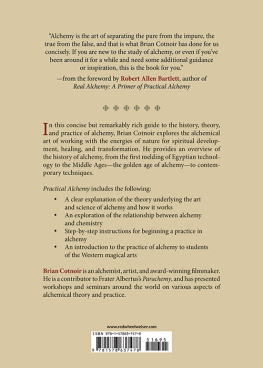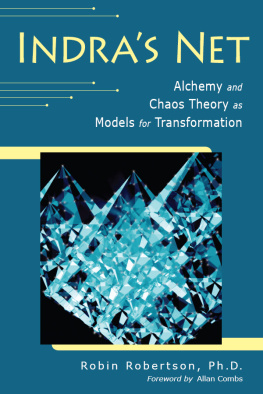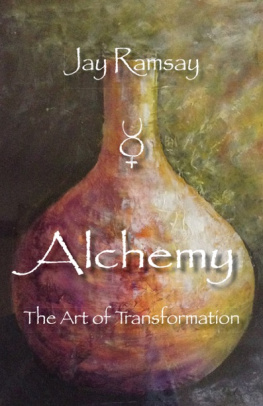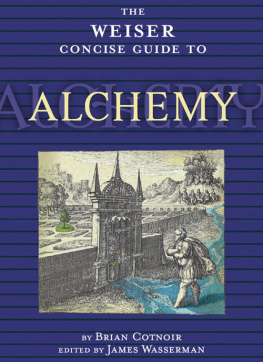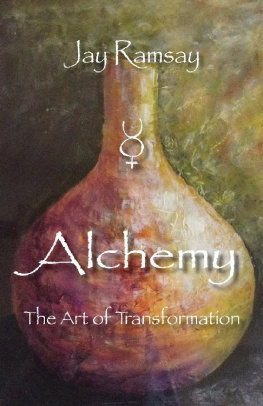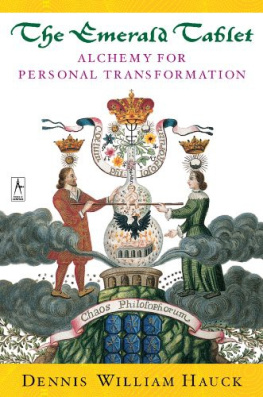

This edition first published in 2021 by Weiser Books, an imprint of
Red Wheel/Weiser, LLC
With offices at:
65 Parker Street, Suite 7
Newburyport, MA 01950
www.redwheelweiser.com
www.redwheelweiser.com/newsletter
Copyright 2006, 2021 by Brian Cotnoir
Introduction copyright 2006, 2021 by James Wasserman
Foreword copyright 2021 by Robert Allen Bartlett
All rights reserved. No part of this publication may be reproduced or transmitted in any form or by any means, electronic or mechanical, including photocopying, recording, or by any information storage and retrieval system, without permission in writing from Red Wheel/Weiser, LLC. Reviewers may quote brief passages. Previously published in 2006 as The Weiser Concise Guide to Alchemy by Red Wheel Books, ISBN: 978-1-57863-379-1. The 2021 publication includes a new foreword.
ISBN: 978-1-57863-747-8.
Library of Congress Cataloging-in-Publication Data available upon request.
Cover design by Kathryn Sky-Peck
Cover art: The true principles of all things, from The works of Jacob Behmen, the Teutonic theosophe, by William Law, 1764/Getty Research Institute, Los Angeles, USA/Bridgeman Images
Interior photos/images by Sesthasak Boonchai and Susan McCann
Typeset in Sabon
Printed in the United States of America
IBI
10 9 8 7 6 5 4 3 2 1
Disclaimer
The practice of alchemy involves working with chemical supplies and techniques that may be dangerous or fatal if done improperly. Every effort has been made in the text to encourage the practitioner both to use proper safety precautions in the experiments suggested and to equip him- or herself with additional formal training in laboratory procedures. In the case of herbal preparations, consult with a physician before ingesting any herbs or tinctures discussed herein. The author, editor, and publisher disclaim any and all responsibility for accidents or problems resulting from improper use of this material. This book is intended for informational purposes only.
If the fool would persist in his folly, he would become wise.
PROVERBS OFHELL, WILLIAM BLAKE
This book is dedicated:
To RC, who taught me to read and that curiosity may have killed the cat but, satisfaction brought him back.
To FC, who taught me that there is nothing supernatural, only natural laws we don't understand.
To EW, for grammar, grace, and beauty.
To the dakinis ML, LC, SC, SF, MM, and ST, who gave with eyes, heart, and handslight, love, and protection.
Sororis mysticae meae, mj mlok LV.
To my teachers too numerous to mention.
To all those who have gone before. and To the one who comes after.
It is my hope that only good may come of this.
ACKNOWLEDGMENTS
I would like to thank:
James Wasserman for the opportunity to present this report from the front and for his patience and faith in me; Sandra Feist, Ina L.Chow, and Maria Levitsky, for their corrections and suggestions; Lucille Carra, Ellen Wood, and Lenka Vaekova for their general feedback and encouragement; Sesthasak Boonchai and Susan McCann for the book's illustrations; and finally Tover for lending me his mom.
CONTENTS
FOREWORD
I f you are new to the study of alchemy, or even if you've been around it for awhile and need some additional guidance or inspiration, this is the book for you.
Where does one begin the study of such a mysterious art? A simple internet search can net you millions of hits; it could take years just to sort out the true from the false. You see, that has always been a problem with the study of alchemy; it has a long history of being presented through a unique terminology (like any other science or art), which is cryptic and obscure if you don't possess certain keys.
We have so much information available to us today; at the push of a few buttons I can view documents across all of recorded history. A book I never thought I'd see because only one or two exist? No problem; now I have a digitized photocopy of it for study.
Now, here's the rub; with alchemy being so mysterious and obscure, there are many who use the wondrous secrets of alchemy to present their version of the story, and suddenly, we are beset with pet theories, aliens, Atlanteans, dangerous chemistry, and government conspiracies. It is easy to get pulled into a labyrinth from which it may take considerable time to unlearn and in some cases, survive.
The famous Swiss physician and alchemist, Paracelsus, said that alchemy is the art of separating the pure from the impure, the true from the false, and that is what my friend and author of this book, Brian Cotnoir, has done for us concisely.
Within the pages of this book you will find a reliable guide on who and what to study and where to delve even deeper if you are truly interested in understanding the Sacred Art that is alchemy, not just from a theoretical and philosophic viewpoint but from its practical applications as well.
How do I know this to be true? I have personally explored alchemy for the past fifty years (yes, there's that much to explore) starting in a time when information about alchemy, especially of a practical nature, was hard to find. And yet, if I had such a book as this and knew it was reliable and true to the Alchemical Art, my searches would have been accelerated beyond measure. I would have known to study such things as Aristotle's Physics and Metaphysics because these ideas held sway all through the Golden Age of Alchemy, and the terminology and concepts presented are what the ancient writers of alchemy were referring to. So when the alchemist Petrus Bonus of Ferrara, in his work New Pearl of Great Price, says, The Philosopher's Stone is the Form of Gold, it takes on a whole new sense considering Aristotle's ideas on Matter and Form.
Our author and guide presents us with another important subject for close scrutiny: Humoral Medicine, the medicine of Roman physician Galen and later expanded by Avicenna. Again, these are the concepts and language the early alchemists thought in. Now, if I come across an alchemical formula that says, This medicine excites the Animal Spirit, I will know that it is not a super aphrodisiac or that I may change into a werewolf, but that it is a liver tonic.
This book touches all the bases you need to delve into deeply in order to gain entrance to the alchemical mysteries. The charts, tables, and line drawings are all very well done and deserve close study.
And don't even get me started on practical matters in alchemy. As a professional chemist, this has been my own area of investigation over the years, and I can tell you flat out that the instructions given in this book are clear and true and can lead you safely into the incredible world of Spagyric and Alchemical Medicines. You can do this yourself and, in so doing, the Alchemical Work becomes elucidated all the more; working with Nature, you can hold the alchemical principles in your hand and create medicines that are effective and sometimes miraculous in effect.
Many people think they can't do this kind of work because they don't have a laboratory and chemical glassware. Setting up an alchemical lab in your house can be a little scary, if you are new to it, but this author offers a very reasonable list of equipment to gather and sound advice on setup, care, and maintenance. Start off slow and gather your tools as needed; many can be found inexpensively in thrift stores.
Next page
